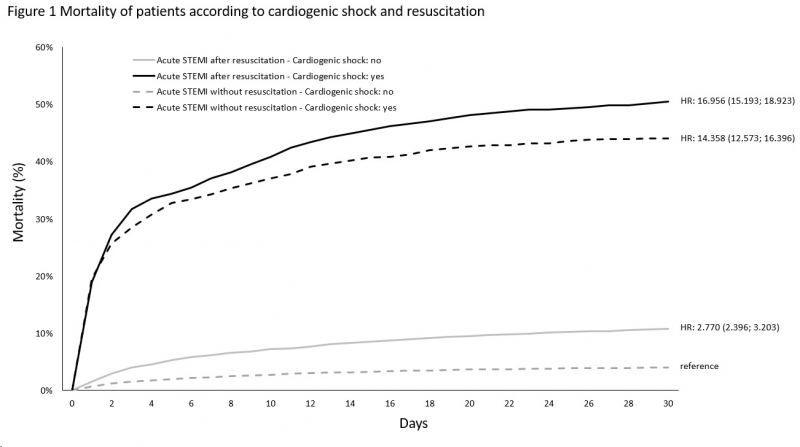THE IMPACT OF CARDIOGENIC SHOCK AND OUT-OF-HOSPITAL CARDIAC ARREST ON THE OUTCOME OF ACUTE MYOCARDIAL INFARCTION. NATIONAL LEVEL ANALYSIS.
Background: Cardiogenic shock (CS) and out-of-hospital cardiac arrest (OHCA) are critical cardiovascular events with profound implications for patient outcomes. This study aims to provide a national level analysis of predictors of CS and OHCA in acute myocardial infarction (AMI) patients and their effect on mortality.
Methods: The analysis is based on data from an all-comers national registry. The 2016-2020 period was chosen for standardized registry data, and 23,703 ST-elevation myocardial infarction (STEMI) patients were analyzed.
Results: We compared 4 subgroups of STEMI patients, A) without CS and OHCA (19,590), B) after OHCA (2,262), C) with CS (713), and D) after OHCA with CS (1,138). Patients after OHCA without CS had the lowest mean age, 62.0 (+/-12.6) years, while patients with CS without OHCA were the oldest, 68.8 (+/-11.8) years. Patients with CS without OHCA had the highest proportions of comorbidities, namely diabetes mellitus (25.0%), chronic kidney disease (6.0%), prior percutaneous coronary intervention (18.8%), and prior coronary artery bypass graft (5.3%). Mortality at 30 days was highest in CS patients complicated by OHCA (48.2%), followed by CS patients without OHCA (42.8%), patients with OHCA without CS (10.6%) and patients without CS and OHCA (4.0%). CS was the most robust predictor of 30-day mortality, odds ratio (OR) 6.627 (95% confidence interval (CI) 5.453; 8.054) for patients after OHCA and 10.352 (8.483; 12.634) for those without OHCA.
Conclusion: OHCA significantly altered the 30-day mortality risk after STEMI for both patients with and without CS. CS is the strongest predictor of 30-day mortality in STEMI, irrespective of OHCA. STEMI patients after OHCA and CS at admission are at the highest risk of death.


